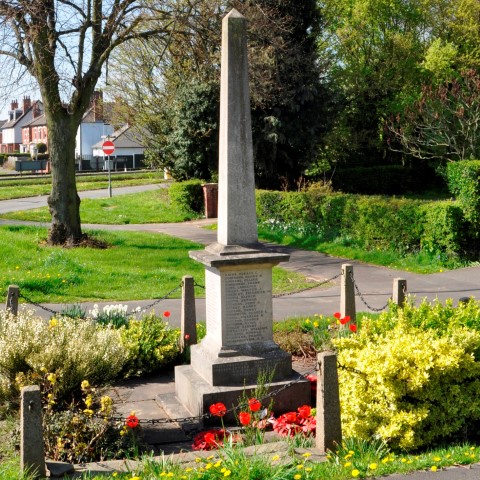Nancy’s Story – Nancy Payne
Bine and Nancy Payne’s wedding photograph in the Ockbrook of 1938, symbolises many aspects of a century caught between modernism and the dead hand of Victorian Britain.
The couple married when the country teetered on the brink of World Ward Two and their children, Roger and Angela were war babies.
Chartered accountant Bine and his young family enjoyed a textbook lifestyle of 20th century upward mobility.
Nancy was the daughter of a Borrowash gardener, but with marriage came undreamt of financial prosperity. Home comforts were complemented by a glittering social whirl in Northamptonshire, courtesy of her husband’s business and Freemason circle. Life was sweet; daughter Angela was offered a place at the Sadler’s Wells Ballet school and son Roger enjoyed the advantages of a private education at Chicheley Hall and Whittlebury boarding schools. It was a privileged and comfortable existence.
But this charmed life came to a rude halt with the sudden death of Bine at the age of 44 from a congenital haemorrhage.
After the flurry of the funeral and obituaries in The Northampton Chronicle, Nancy, Roger and Angela emerged blinking into a changed world.
From a distance of over fifty years, Angela’s memories are vivid:
Mum’s hair had turned white overnight. People tiptoed around us. Roger had to leave his school and we were kept away from what was happening. We didn’t know what was going on and we were never included in things.
People didn’t tell the children what was happening in those days. We were confused and frightened.
In fact, the bereaved family was plunged into chaos.
Bine had died without making a will; there was no money for Roger’s school fees and at fifteen, his education had come to an abrupt halt. Bine Payne’s entire financial estate was swallowed up by the Government!
Sadly, according to Angela, the fall-out need not have been so dramatic. Nancy would have been entitled to apply for financial assistance and in all probability; Roger could have kept his place at Whittlebury.
But his mother had nobody to advise her and his grandfather, schooled in Victorian England, felt compelled to take charge. Roger was ordered to begin work at a bank – a job that he hated from the outset and was soon to abandon.
Bine’s death cast a long shadow over Roger’s life as he switched jobs and searched in vain for direction, losing faith in a God whose very existence seemed to fly in the face of his father’s death.
Eventually, he decamped to the Isle of Man and took out citizenship, marrying in his fifties and working on a factory floor.
He had no children and died of brain cancer in 2005, having lived a life that was unfulfilled and very different from the one he might have expected.
For Angela:
What happened to Roger was the real tragedy. He never recovered from Dad’s death.
Meanwhile, Nancy faced a future with no husband, two teenage children and bills to pay.
Angela noticed that things had changed overnight – and not for the better:
We had never wanted for anything – if we wanted to buy something, it was never a problem – we always got it. Now Dad was dead we couldn’t have things. Mum taught me tapestry and embroidery but it wasn’t the same.
Popular, pretty Nancy, once the toast of Northamptonshire learnt the hard way the difference between true and fair-weather friends.
According to Angela:
After the funeral, some people just dropped off. They kept away and just didn’t want to know. She soon learned the hard way who her true friends were.
It was a culture shock for Nancy. Angela remembers staring wide-eyed as her mother in years past, had swept out on her husband’s arm to yet another dinner dance, dressed to the nines in exquisite taste:
Her dresses were gorgeous. I remember her fur capes and a midnight blue lace evening gown – also a lovely black dress with a scooped top and wide Lurex skirt.
After Bine’s death previously plentiful invitations to parties and dinner dances were few and far between although several friends from the Masonic and business world remained stalwart. .
Of course, a woman with Nancy’s looks and social skills was not without her admirers – or marriage proposals – and prospective suitors started to circle.
Angela admits that she would have hated her mother to re-marry at the time, but now regrets that Nancy did not find happiness and companionship with somebody else.
But re-marriage was either not ‘the done thing’ or her mother was never tempted, and she said on many occasions;
Once you’ve had the best, why bother with the rest?
But the first priority was to put bread on the table and Nancy’s party clothes were moth-balled as she took a string of jobs to feed the family and keep a roof over their heads.
She was tough and courageous and never complained as she took jobs as a clerk in the Department of Social Security – and on the factory floor at Mansfield’s Shoe Factory.
Angela admits that this must have been a culture shock for her mother – but Nancy didn’t speak about her feelings and it didn’t seem right to question her.
The factory floor was a world away from formal dining – but Angela believes that it must have offered her mother warmth and companionship as well as supplying the all-important income.
Angela left school at fifteen, worked initially in a solicitor’s office and then added to her qualifications with a course in shorthand and typing.
Her father and mother had met at a village hop – somewhere near Borrowash, but Angela met her future husband, Bryan Fretter at a disco in 1960s Northampton.
He worked at a building supplies firm called Travis Perkins but later took a job as a Contract Manager with an oil company and they moved to Scotland where they set up home.
Nancy’s later life is marked by her ever-present characteristics of independence and closeness to family.
In her early sixties, she moved to a flat near the centre of Northampton but still kept in close contact with her sisters. Angela recalls her mother and two aunts taking seaside holidays inKent and sunbathing in their deck chairs like three wise monkeys.
Following two heart attacks and a stroke, she moved to live with her daughter in Scotland – largely on the insistence of Bryan who knew that Angela would worry about her mother unless she could keep an eye on her!
By then, they had children of their own and life was generally harmonious, although it was not always easy for three generations with different habits and tastes to co-exist under the same roof.
Just as Bine and Nancy’s lifestyle differed sharply from that of their parents, so Angela still marvels at her mother’s beliefs and ways.
Nancy’s rule of thumb for a happy marriage was a book of advice to young wives – still in Angela’s possession although tattered and torn from constant usage.
It’s got sections called ‘Men’s’ etiquette’ and ‘Ladies’ etiquette and whole pages on the correct way to serve afternoon teas.
You were always supposed to stand up when an older person came into the room – and Roger did this till the day he died!
Mother regarded the section on how to treat your husband like the bible!
You always had to change your clothes so you looked fresh and charming to smooth his brow on his return from work and you had you offer him a welcoming drink – like a gin or a whisky.
Nancy’s last years were spent first in a sheltered housing complex in the village of Lumsden, near to Angela and then in a nursing home where she was visited by her family two or three times a week. By this time, Angela was working as a home help and the nursing home was near at hand.
Alert and sharp until the end, Nancy died in 1999 aged 85 in a hospital in Aberdeen, just missing the dawn of the new century
She was cremated, and her ashes are scattered on Suie Hill in the Scottish countryside where she enjoyed going for car drives with Angela and Bryan.
She didn’t want to be re-united with Bine in Northampton, saying, in accordance with her faith: We’ll be together anyway.
Nancy and Bine’s story concludes with another photograph of their wedding, sent to me by Angela to accompany these memories of her mother.
As before, the sun shines upon a couple who cannot see into the future – and who are forever young at the door of a church in Ockbrook on the threshold of their married lives.
Golden lads and girls all must
Like chimney sweepers turn to dust.
But not then. And not yet.
I would like thank Angela Fretter for sharing her memories of her parents – and for their unique contribution to Unexamined Lives.
Helen Clark.





